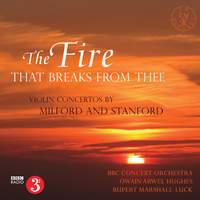Recording of the Week,
Violin Concertos by Stanford and Milford
This week’s CD comes courtesy of the English Music Festival, a relatively young organisation dedicated to expanding awareness and appreciation of English music – particularly of the Romantic era. The Festival operates its own independent record label, EM Records, which has released a series of well-received discs of relatively obscure English repertoire; the previous, for example, comprises the works of Herbert Howells for violin and piano.

The focus on the violin remains in this latest release, which features two concerti for the instrument. The first is of both musical and academic interest, being an orchestration by Jeremy Dibble of the piano score of Stanford’s Second Violin Concerto – left un-orchestrated by the composer, and thus providing both a conundrum and an opportunity for musicologists today. Dibble’s solution is to take his cue from the First Concerto and from Brahms, choosing relatively lightweight orchestral forces and allocating characterful solos to woodwind instruments as a means of achieving contrast and avoiding an excessively string-dominated sound throughout.
As with other orchestrations after the event, there’s always the question of how closely it matches what the composer would have done – but at the end of the day, Dibble’s scoring succeeds primarily because it is unobtrusive. The whole work feels natural and cohesive, and it’s certainly not obvious to the listener that its final form is in fact the result of a collaboration across the centuries. The final movement is particularly fun, with choppy and aggressive double-stopping from the soloist setting off a rollicking sonata rondo.
I had only dimly heard of the composer of the other concerto on this disc – Robin Milford, an Oxonian and a rough contemporary of Vaughan Williams and Finzi. His concerto – an unusually large-scale work lasting nearly three quarters of an hour in total – lapsed into obscurity after an initial burst of popularity in the 1940s, and its lyrical charm underlines how valuable the English Music Festival’s work is in reviving interest in such works. The first movement starts off in pensive mood, but explores a wide range of musical moods over the course of nearly twenty minutes. The second, very much unlike that of Stanford (a lyrical episode that seems to hark back to the composer’s Irish roots) is surprisingly extrovert and certainly doesn’t follow the conventional model for the slow middle movement of a concerto; it is initially based on a majestic, declamatory fanfare-like motif in the orchestra that makes an almost stern impression, and its climax is if anything more forceful than that of the first movement.
The final movement also breaks the mould somewhat; although it starts off as a jolly dance that makes great use of hemiola-like rhythmic playfulness and syncopation, towards the end it takes a very much quieter, more introspective turn and the work closes in decidedly subdued fashion, with the soloist bringing down the curtain. It’s hard to know what to make of this; Milford was prone to quite abrupt bouts of depression, so one could see it as an expression of this side of his personality – similar to some of Elgar’s sudden, disorientating mood-changes. Whatever the explanation, it’s an intriguing end to a piece with real depth and variety, and soloist Rupert Marshall-Luck is clearly in his element with music of this kind. His performance in both concerti is sensitive and committed, and he’s a convincing advocate for both works.
This is a lovely disc (the bonus of Holst’s spirited Walt Whitman overture is the icing on the cake!) and really brings these two pieces to life. It has certainly made me want to explore the works of Milford further – and the orchestrated Stanford shows a side of this composer that I hadn’t really been aware of before. Highly recommended!
Rupert Marshall-Luck (violin), BBC Concert Orchestra, Owain Arwel Hughes
Available Formats: CD, MP3, FLAC



